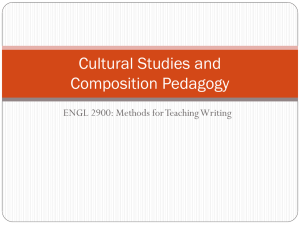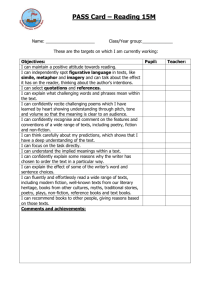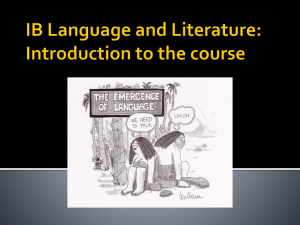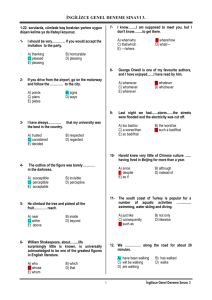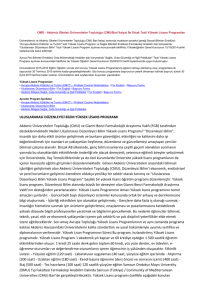Meslek yüksek okullarında okuma parçalarına dayalı
advertisement
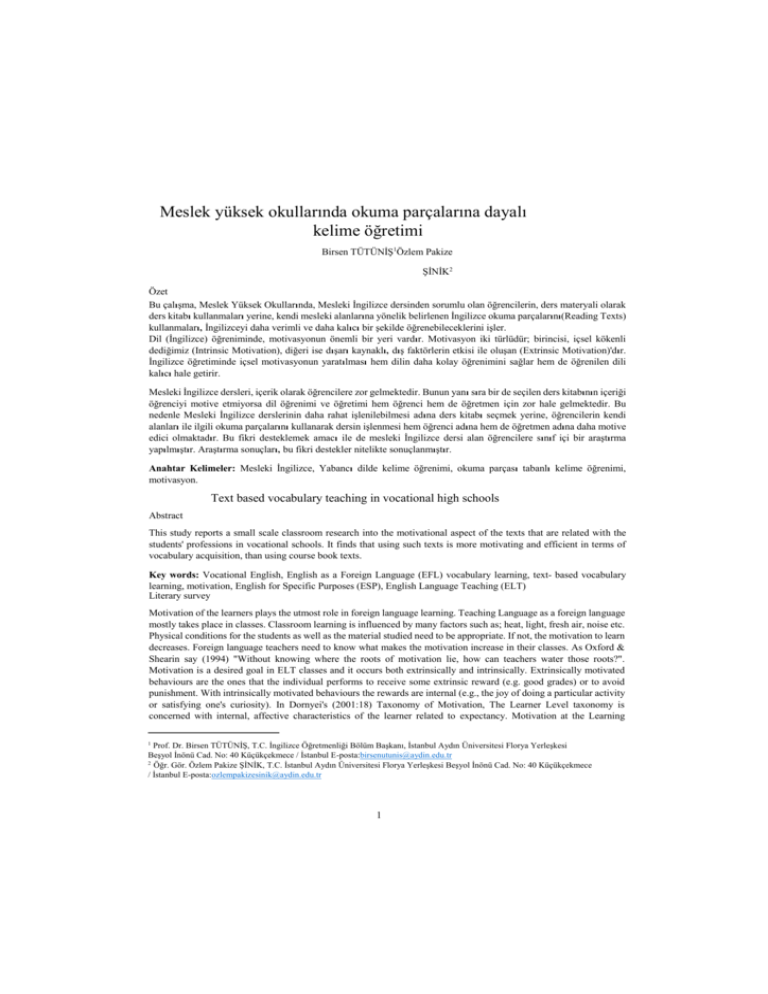
Meslek yüksek okullarında okuma parçalarına dayalı kelime öğretimi Birsen TÜTÜNİŞ1Özlem Pakize ŞİNİK2 Özet Bu çalı şma, Meslek Yüksek Okulları nda, Mesleki İngilizce dersinden sorumlu olan öğrencilerin, ders materyali olarak ders kitabı kullanmaları yerine, kendi mesleki alanları na yönelik belirlenen İngilizce okuma parçaları nı (Reading Texts) kullanmaları, İngilizceyi daha verimli ve daha kalı cı bir şekilde öğrenebileceklerini işler. Dil (İngilizce) öğreniminde, motivasyonun önemli bir yeri vardı r. Motivasyon iki türlüdür; birincisi, içsel kökenli dediğimiz (Intrinsic Motivation), diğeri ise dı şarı kaynaklı, dı ş faktörlerin etkisi ile oluşan (Extrinsic Motivation)'dı r. İngilizce öğretiminde içsel motivasyonun yaratı lması hem dilin daha kolay öğrenimini sağlar hem de öğrenilen dili kalı cı hale getirir. Mesleki İngilizce dersleri, içerik olarak öğrencilere zor gelmektedir. Bunun yanı sı ra bir de seçilen ders kitabı nı n içeriği öğrenciyi motive etmiyorsa dil öğrenimi ve öğretimi hem öğrenci hem de öğretmen için zor hale gelmektedir. Bu nedenle Mesleki İngilizce derslerinin daha rahat işlenilebilmesi adı na ders kitabı seçmek yerine, öğrencilerin kendi alanları ile ilgili okuma parçaları nı kullanarak dersin işlenmesi hem öğrenci adı na hem de öğretmen adı na daha motive edici olmaktadı r. Bu fikri desteklemek amacı ile de mesleki İngilizce dersi alan öğrencilere sı nı f içi bir araştı rma yapı lmı ştı r. Araştı rma sonuçları, bu fikri destekler nitelikte sonuçlanmı ştı r. Anahtar Kelimeler: Mesleki İngilizce, Yabancı dilde kelime öğrenimi, okuma parçası tabanlı kelime öğrenimi, motivasyon. Text based vocabulary teaching in vocational high schools Abstract This study reports a small scale classroom research into the motivational aspect of the texts that are related with the students' professions in vocational schools. It finds that using such texts is more motivating and efficient in terms of vocabulary acquisition, than using course book texts. Key words: Vocational English, English as a Foreign Language (EFL) vocabulary learning, text- based vocabulary learning, motivation, English for Specific Purposes (ESP), English Language Teaching (ELT) Literary survey Motivation of the learners plays the utmost role in foreign language learning. Teaching Language as a foreign language mostly takes place in classes. Classroom learning is influenced by many factors such as; heat, light, fresh air, noise etc. Physical conditions for the students as well as the material studied need to be appropriate. If not, the motivation to learn decreases. Foreign language teachers need to know what makes the motivation increase in their classes. As Oxford & Shearin say (1994) "Without knowing where the roots of motivation lie, how can teachers water those roots?". Motivation is a desired goal in ELT classes and it occurs both extrinsically and intrinsically. Extrinsically motivated behaviours are the ones that the individual performs to receive some extrinsic reward (e.g. good grades) or to avoid punishment. With intrinsically motivated behaviours the rewards are internal (e.g., the joy of doing a particular activity or satisfying one's curiosity). In Dornyei's (2001:18) Taxonomy of Motivation, The Learner Level taxonomy is concerned with internal, affective characteristics of the learner related to expectancy. Motivation at the Learning Prof. Dr. Birsen TÜTÜNİŞ, T.C. İngilizce Öğretmenliği Bölüm Başkanı, İstanbul Aydın Üniversitesi Florya Yerleşkesi Beşyol İnönü Cad. No: 40 Küçükçekmece / İstanbul E-posta:birsenutunis@aydin.edu.tr 2 Öğr. Gör. Özlem Pakize ŞİNİK, T.C. İstanbul Aydın Üniversitesi Florya Yerleşkesi Beşyol İnönü Cad. No: 40 Küçükçekmece / İstanbul E-posta:ozlempakizesinik@aydin.edu.tr 1 1 yüksek okuma parçalarına dayalıspecific, kelime öğretimi Situation Level is influenced by a number ofMeslek intrinsic and okullarında extrinsic motives that are course teacher specific, and group specific. Deci and Ryan (1985, 2002) argue that intrinsic motivation is potentially a central motivator of the educational process: Intrinsic motivation is in evidence whenever students' natural curiosity and interest energise their learning. Extrinsic motivation has traditionally been seen as something that can undermine intrinsic motivation; several studies have confirmed that students will lose their natural intrinsic interest in an activity if they have to do it to meet some extrinsic requirement. This is often the case with compulsory readings in the course book in EFL classes. While organising the course materials we should consider students' professions in Vocational High Schools. Using any course book for the sake of teaching English will lower the motivation since their need is to learn English related to their field. "The results of a number of studies strongly suggest that picking up words by reading meaningful texts (and hearing interesting stories) is more efficient, in terms of words acquired per hour, than any kind of deliberate study (Krashen 16.11.2010)". The research Aim The aim of the study is to create intrinsic motivation to learn English both as ESP and as general English. Reading texts related to students' professions are chosen for class work to support the aim.. Objectives; The objectives of the study can be stated as follows; - To motivate students to learn how to learn English related to their professions, - To make them realize that they can do it by encouraging them to develop self confidence. Research questions 12- How can I motivate my students to learn English? Will my students be more motivated if I work with texts about their professions instead of using a course book? 3Will text based teaching make my students' life long learners? 4- Will my students learn the new vocabulary and remember better if the class work is ESP text based? Research method Related to the EFL needs of Vocational High Schools a mini classroom research was conducted with the aim of assessing motivational vocabulary learning on subject based reading texts. Classroom research is a type of action research where the researchers conduct researches to improve the present conditions (McKay, 2006).The subjects were 30 preintermediate level students of Photography and Radio-Television Vocational High Schools. The study was based on the class work done in the first semester of the academic year. In the first term, there was a course book chosen and the syllabus was made according to texts covered in the book. In the Final exam, the vocabulary section of the test covered randomly chosen words taught during the first semester. Students' success rate was 70% in the vocabulary section. The same test was given a month later at the beginning of the second term. The success rate of the vocabulary section fell to 40%. Students had studied for the exam but not transferred the knowledge to long term memory. Teachers had to focus on the grammatical items in the texts and did a lot of exercises on tenses. It was a method similar to the one they experienced in the secondary schools. Their expectations were not met. Therefore, the second term's study had to be revised in terms of motivation and vocabulary learning. In the second term, five texts related to photography and radiotelevision were chosen to be studied in class. The topics were "How does a photographer take a photo? An interview with a pop star, A photograph course for juniors, what are the qualities of being good photographer? The daily life of an anchorman.". A test was prepared with the vocabulary the students were expected to learn during the second term (three months). This test was conducted as a pre-test of the mini research. The result was as expected. The students did 2 yüksek okullarında okuma parçalarına not know the words and the overall score wasMeslek % 5. The procedure of classroom activitiesdayalı for akelime text inöğretimi the second term's syllabus is given below. The first text was about photography. The tasks related to texts focused on vocabulary not on tenses. Students' learning process was subconscious, because they focused on the content not on the form. Some of the classroom activities were as follows: The Topic The topic is "Photography" and the text is about how to take photographs. Exercises 1In the first phase, students read only the title and try to guess about the text they will read. While some of the students talk about the title, some of them only listen. They understand but do not speak. 2Later, as a second exercise, they listen to the text and then read the text over the projector. Then, they do some true/ false exercises. Sentences are about the text. Some of them are affirmative sentences, some of them negative and some of them questions. 3The third exercise is synonym match exercise. Students match the new words with their synonyms. So, students don't feel stressed, because they can look and check the answer from the text. They acquire the new vocabulary step by step subconsciously. 4The fourth exercise is "While Reading / Listening" activity. In this activity, again the same text is used. Students are asked to fill the gaps with the correct words. 5- In the fifth activity, students ask and answer questions about the text which encourages them to speak using the words they have learnt from that text. As an extension of this activity students are asked general questions related to the topic studied. Students are assigned to find texts similar to the one they studied, read and prepare a five minutes' presentation on that topic. The students were highly motivated doing the text. A questionnaire was administered to check upon student interest. The result was positive. The students were actively involved and the teacher was the facilitator. At the end of the term, the pre-test on vocabulary was administered. The students were not informed about the test beforehand, but on the day it was given, the students were told that this is done just to check how much they remember not with the purpose of grading. The result was satisfactory. The overall score was % 83. In the final exam, grammar items had to be tested as well. So, the vocabulary section covered randomly chosen words from the texts they studied and the result for that part was % 100. The result showed the effect of students' learning motives on their pedagogical achievements in EFL, especially on vocabulary learning. Discussion Learning Professional English can be difficult but applying some new methods such as text based vocabulary learning can solve the obstacles in learning. Choosing some texts about Ss' own professions are really motivational in ESP learning for ESP learners. It is also motivational for the teachers, too. Because as teachers, seeing students learn the language make us really happy. This study answered all our questions about texts based vocabulary teaching. Using the text based vocabulary teaching is more motivating and enjoyable than teaching with compulsory irrelevant course book in vocational high schools. This study can be taken as a model in the curriculum of English Language Teaching of the Vocational High Schools. As the result of this study indicates, both the teacher and students are pleased to work in enjoyable and high motivational ESP classes which make the most difficult task- vocabulary learning- easier. 3 References Meslek yüksek okullarında okuma parçalarına dayalı kelime öğretimi Deci, E.L., Ryan, R.M. (1985). "Instric Motivation and Self -determination in Human Behaviour". Plenum Press, 1522, New York. Dornyei, Zoltan, (Autumn, 1994). "Motivation and Motivating in the Foreign Language Classroom". The Modern Language Journal, Vol. 78, No. 3 pp. 273-284, Blackwell Publishing on behalf of the National Federation of Modern Language Teachers Associations, http://www.jstor.org/stable/33010 (15.12.2010) Krashen, Stephen, (2010)." New Trends and Innovation in Elt". A conference, Istanbul, T. McKay, S.L. (2006) " Researching Second Language classrooms, LEA publishers, NewYork Oxford, R.L., Shearin, J. (1994). "Language learning motivation: expanding the theorical framework". The Modern Language Journal. http://www.jstor.orgTexts were taken from Breaking News English website: www.breakingnewsenglish.com 4 Meslek yüksek okullarında okuma parçalarına dayalı kelim 5






